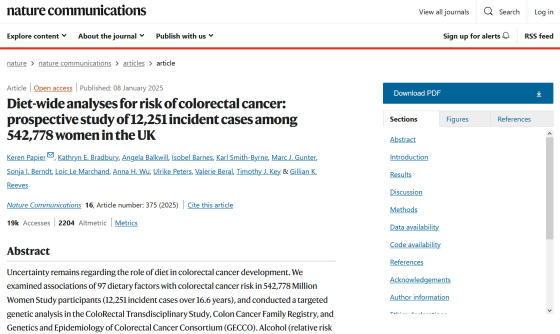Drinking one glass of milk a day may reduce risk of colon cancer, study finds

A research team including Oxford University in the UK has reported that in a study of more than 500,000 subjects looking at the relationship between dietary habits and
Diet-wide analyzes for risk of colorectal cancer: prospective study of 12,251 incident cases among 542,778 women in the UK | Nature Communications
https://www.nature.com/articles/s41467-024-55219-5

Why a daily glass of milk really could reduce bowel cancer risk – an oncologist explains
https://theconversation.com/why-a-daily-glass-of-milk-really-could-reduce-bowel-cancer-risk-an-oncologist-explains-247301
Nearly 45,000 people are diagnosed with bowel cancer each year in the UK, making it the third most common type of cancer in the country, however most cases are preventable.
According to Cancer Research UK , 54% of bowel cancer cases could be prevented by leading a healthier lifestyle . Lifestyle habits associated with an increased risk of bowel cancer include smoking, lack of exercise, consumption of alcohol and processed meat, and poor diet.
To investigate the association between milk consumption and colorectal cancer risk, a research team led by researchers at the University of Oxford collected genetic data from more than 542,000 women to look for genetic variants related to the ability to break down the lactose found in milk. They also collected detailed information about their diet, including the amount of milk consumed per day, and combined these data sets to analyze the association between milk consumption and other dietary habits and colorectal cancer risk.

The study found that participants who consumed an additional 244g of milk per day (equivalent to one glass, or about 300mg of calcium) had a 17% lower risk of developing colorectal cancer. This risk reduction effect was seen across a variety of milk types, including whole milk, low-fat milk, and non-fat milk.
The research team also found that the effect of milk on reducing colorectal cancer risk was independent of other dietary factors and lifestyle habits. In other words, the reduction in colorectal cancer risk due to milk consumption is not related to unhealthy habits such as reducing intake of sugary soft drinks and carbonated drinks, or to healthy lifestyles such as 'milk drinkers being more conscious of their health in other areas of their diet.'
The study also looked at factors other than milk, reporting that consuming an additional 20g of alcohol per day, equivalent to one large glass of wine, increased the risk of colorectal cancer by 15%. It also found that consuming 30g or more of red or processed meat per day increased the risk of colorectal cancer by 8%.

The researchers believe there are several possible explanations for why milk consumption reduces colon cancer risk. First, the high calcium content of milk has been linked to a reduced colon cancer risk in previous studies . Calcium may help protect against cancer by binding to potentially harmful substances in the intestine and promoting the death of abnormal cells.
In addition, the lactose in milk promotes the growth of intestinal bacteria that produce butyric acid, which has anti-inflammatory and anti-cancer properties, and milk also contains conjugated linoleic acid , a type of fatty acid that is thought to have anti-cancer properties .
'Overall, this groundbreaking study provides compelling evidence for the potential role of milk consumption in reducing bowel cancer risk,' said Justin Stebbing, professor of biomedical sciences at Anglia Ruskin University in the UK, who was not associated with the study. 'The finding that relatively modest increases in daily milk intake were associated with a significant reduction in bowel cancer risk is particularly encouraging. This suggests that small, achievable changes in diet can have a meaningful impact on public health.'
Related Posts:







